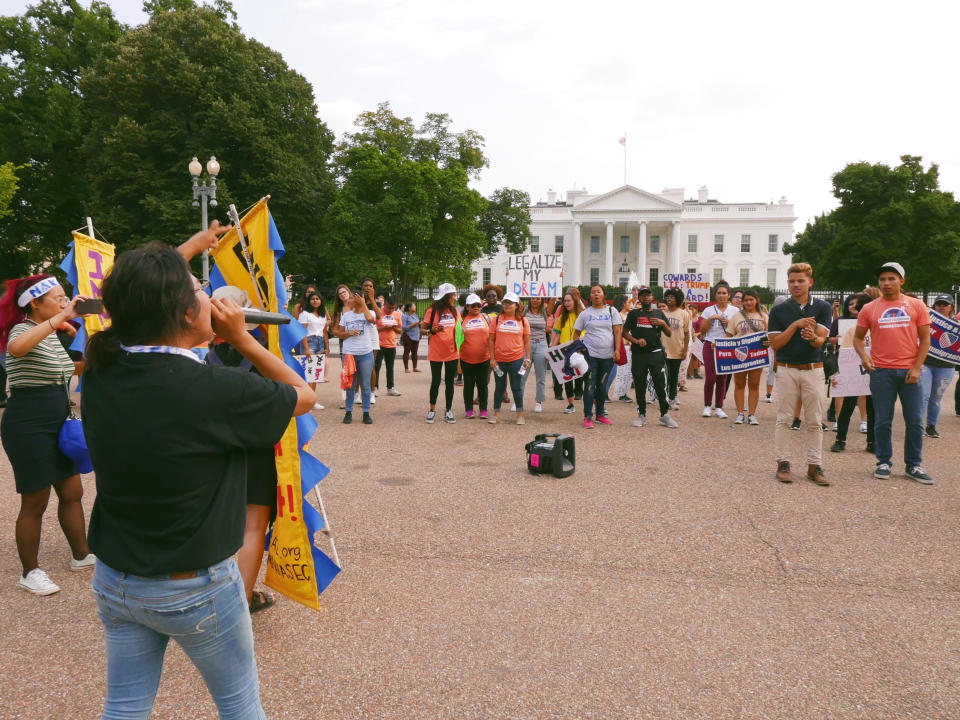Trump’s DACA decision sparks a day of protests at the White House
WASHINGTON — President Trump’s decision to end the Deferred Action for Childhood Arrivals program led to protests across the country, including one all day Tuesday in front of the White House. A crowd of hundreds gathered in Washington prior to Attorney General Jeff Sessions’ official announcement that the president had ordered the program, which provides work permits to about 800,000 undocumented immigrants who were brought to this country as young children, to be phased out.
The protesters included many DACA recipients. A 25-year-old Pennsylvania woman named Camila Contreras told Yahoo News that her parents brought her to the United States from Colombia when she was a child. She described the impact of Trump’s decision as “so confusing.”
“It’s just like not knowing what’s going to happen. It’s so unpredictable, so heartless,” Contreras said.
The program will be wound down over the next six months, unless Congress acts before then to extend or replace it. At a briefing with reporters on Tuesday, White House press secretary Sarah Sanders said Trump’s decision came as a response to a group of 10 state attorney generals who were suing the federal government to end the program, which President Obama implemented with a policy memorandum in 2012.
Related slideshow: Immigrants and advocates rally in support of DACA >>>
Sanders noted that, at the time, Obama framed the policy as a temporary measure that would be in place until Congress came up with a more permanent solution. Congress has previously failed to pass similar legislation several times. At the briefing, Sanders said Trump is optimistic Congress will find a solution, but she wouldn’t say if Trump would continue the program if Congress does not act or whether he will deport former DACA recipients if the policy ends.
Opponents of DACA have argued that the recipients, who are often referred to as DREAMers, are hired for jobs that would have gone to American citizens. Immigration advocates say immigrants often take low-paying jobs others do not want or do not have specialized talents to fill. At the protest, Contreras offered her own take by carrying a sign that read, “Roses are red, Guac is enjoyable, Don’t blame DREAMers because you are unemployable.” She explained to Yahoo News that she did not want to return to Colombia because “the economy’s really bad there.” Contreras also noted DACA recipients “grew up here” in the United States and often have tenuous connections to their countries of origin.
“Like most of our Spanish is really crooked and bad,” said Contreras. “If we go back, we’d be lost.”
Bryan Diaz, a 20-year-old video editor at a local TV station in Mamaroneck, N.Y., said he received DACA after coming to the United States from Mexico with his parents 10 years ago. Speaking in Spanish, he described DACA as “something very incredible for me,” and explained why he doesn’t want to return to Mexico.
“I’m used to it here. This is where I have a life. This is where I have everything,” said Diaz.

Not all of those who attended the protest were DACA recipients. Karina Mendoza told Yahoo News she obtained U.S. citizenship after her family brought her to this country at a young age, but says she understands not all immigrants can go through that process. In a reference to Trump’s Slovenian-born wife, Melania, she said: “The U.S. has always been a country of immigrants, whether they are Irish, whether they are Jewish, whether they’re Italians, whether they’re Melania, they all come here for a reason.”
Mendoza said America should be welcoming to immigrants because of its status as a “beacon of hope” and its role in “historical colonization issues” that “created a system where a lot of countries are not enriched.”
DACA recipients pay biannual fees to renew their status. Earlier this year, the right-leaning CATO Institute said deporting the people in the program would cost the federal government more than $60 billion “along with a $280 billion reduction in economic growth over the next decade.”
Mendoza similarly argued that DACA recipients contribute to the economy. She also said the country has invested in them. Mendoza pointed to her own family’s immigration story as evidence “DREAMers make this country richer.”
“We have benefited and we have contributed to our society. My sister’s a high school principal out in California. I’m here working for a nonprofit,” said Mendoza.
Alejandrina Zomora told Yahoo News that she is an undocumented immigrant from Mexico living in New York. She said she came to Washington for the protest “so that Trump knows that we’re not afraid and we’re all here united.”
“They are taking away from our DREAMers and the young people who came here at such a young age and they’re being left with nothing,” Zomora said in Spanish. ‘We’re asking President Trump to touch his heart, to think a little bit. We’re not hurting anyone. We came here to work. We are not hurting anyone. Just let us work.”
Zomora argued that the six-month window and possible congressional action to save the program left DACA recipients in a difficult position.
“They have us, as us Mexicans say, dancing. They tell us yes, then they tell us no. Let’s hope that the president changes his opinion to allow our dreamers DACA — to come here and work legally,” said Zomora.
Zomora is not a DACA recipient and, as an undocumented immigrant, she is subject to deportation. Yahoo News asked Zomora if she felt speaking out and protesting is a dangerous risk.
“Yes, we have the risk that they are going to take us and deport us, but the hand of God has more power,” she replied.
_____
Read more from Yahoo News:


